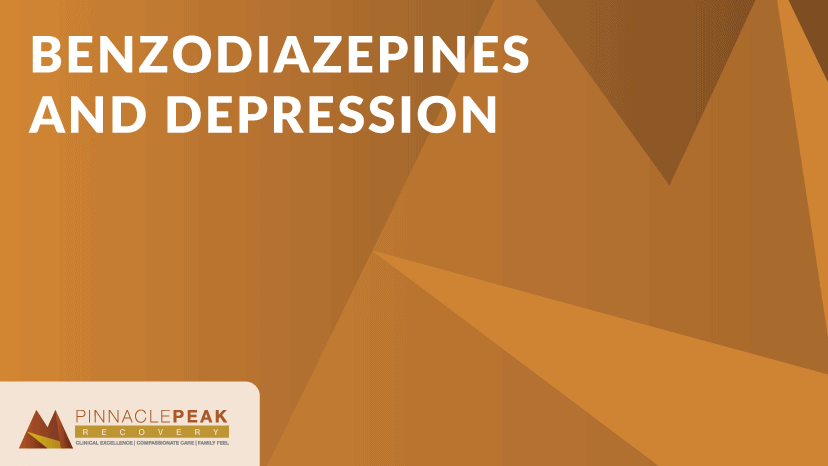Benzodiazepines, or benzos, are a type of medication. Many other prescription medications fall under the benzodiazepine umbrella. Some of the most common benzo medications are Xanax and Valium.
It’s important to understand that benzodiazepines are not an uncommon prescription for people to have. This doesn’t mean, however, that they are safe outside of directed use. At Pinnacle Peak, we understand that substance use disorders can come about in many different ways. Benzodiazepines have a high potential for withdrawal even when used as instructed.
In 2019, 16.8% of adults in Arizona reported having depression, or symptoms of it. Benzodiazepines depressants, which means they are commonly used to assist those that are looking for help with their symptoms of anxiety. Some benzos are also used as seizure medication, or as a sleep aid. Being a depressant-based medication doesn’t mean it causes or contributes to depression – it just refers to how the substance affects the brain – by slowing it down. Are they ever prescribed for those with depression, though?
Are Common Prescription Benzodiazepines Good for Depression?
Most forms of benzodiazepines are primarily used for one of three things: anxiety, seizures, or as a sleep aid. This doesn’t mean they aren’t used for other things, though. Some benzodiazepines are even used to help those experiencing alcohol withdrawal.
If you have depression and are wondering what types of medication you might be prescribed, the most common prescriptions for depression are antidepressants, which are the opposite of benzodiazepines. Some people who are experiencing depression might already be prescribed benzos to assist with a different problem. It’s important to speak with your doctor or medical professional about the medications you are currently taking and if they’re working for you. Medications can interact with each other and cause negative side effects or cancel each other out, making them less effective for the patient.
As with most prescription medications, benzodiazepines have a list of possible side effects. Depression is one of the side effects of benzodiazepines, but this doesn’t mean you’re guaranteed to be affected by it.
Can Long-Term Use of Benzos Trigger Depression?
Many forms of benzodiazepines are not recommended for regular use. They primarily act as a way to help with a problem at the moment, as opposed to being a way to consistently manage symptoms.
If you or a loved one has a benzodiazepine use disorder and is worried about the potential for developing or worsening depression, here are some of the most common long-term side effects that you should know about:
- Memory Loss
- Anxiety
- Depression
- Paranoia
- Lethargy or lack of motivation
- Fatigue
- Headaches
- Nausea
Benzodiazepines have been shown to negatively affect the symptoms they were originally trying to control when used improperly over long periods of time.

Is Depression One of the Side Effects Caused By Benzodiazepine Withdrawal?
Benzodiazepines, in all of their forms, have the ability to cause withdrawal. They come in three types: short-acting, intermediate-acting, and long-acting. The most common ones seen are short-acting and long-acting, which refers to how long the substance stays in a person’s system and how long it's effective.
Short-acting benzodiazepines have a higher risk of a more severe withdrawal due to the shortened amount of time they’re in the body. This leaves the body with less time to adjust to not having benzos in the system. Long-acting benzodiazepines can also cause withdrawal, but the effects of it are usually less severe.
The experience of withdrawal is different for everyone, depending on many factors, from the length of time the substance was used, to metabolism, to what other substances might be in your system. In some instances, sudden withdrawal can lead to severe symptoms such as seizures, so if you’re planning to stop benzodiazepine use, it’s important to reach out to a medical professional for help.
Here are some symptoms you might experience from benzodiazepine withdrawal:
- Aching or twitching muscles
- Dizziness
- Headaches
- Tremors
- Nausea and vomiting
- Fatigue and difficulty sleeping
- Anxiety
- Altered perception
Depression is not a common side effect of withdrawal. If you or a loved one is wanting to stop substance use or is experiencing withdrawal, we’re here to help.
A Clean Future Is Just A Call Away
Let the team at our drug rehab facility in Scottsdale guide your journey.
Treatment Options for Depression
In 2020, 21 million adults across the United States reported having at least one major depressive episode in that year alone. Untreated depression is a common factor for substance use disorder, as some might look to substances as a means of treating their depression symptoms. Alternatively, certain substances can contribute to or lead to depression in patients who didn’t have it prior to the substance use.
If benzodiazepines aren’t an option for treating depression, what other options do you have?
Prescriptions such as anti-depressants can be helpful. They are most effective when combined with therapy, where you can develop skills to help manage your symptoms, and begin to unlearn behaviors and mindsets that come along with depression.
Here at Pinnacle Peak Recovery, we offer treatment options for mental health and addiction recovery. Co-occurring disorders, or when a person is experiencing both a mental illness and a substance use disorder, are very common. We understand the importance of treating all aspects of a person on their road to recovery.
If you or a loved one is struggling with benzodiazepine use disorder, depression, or both, we want to help. Give us a call today at (866) 377-4761 to learn more about our treatment options and what will work best for you.

